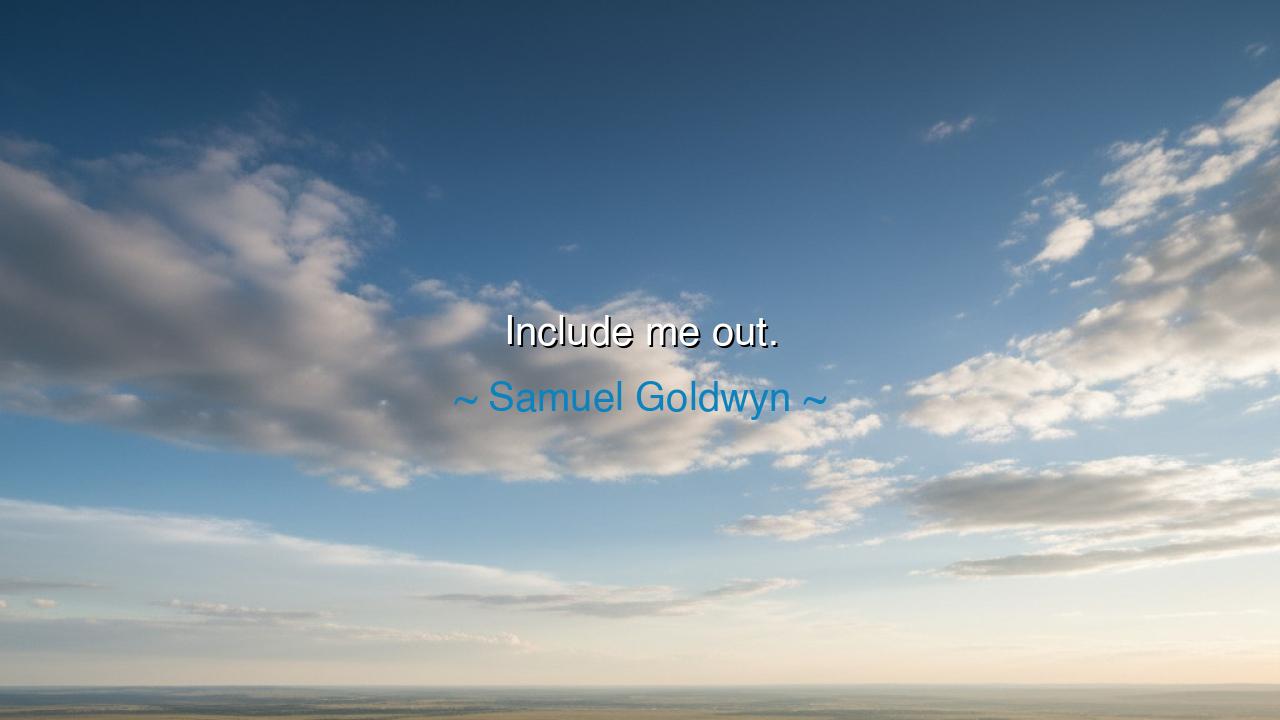
Include me out.






In the great theater of life, where the stage is set with the passions, ambitions, and desires of countless souls, there are moments when a single phrase can encapsulate a profound truth—one that speaks not only to the individual but to the collective experience. Samuel Goldwyn, a figure of considerable influence in the world of cinema, once quipped, “Include me out.” This seemingly paradoxical statement, delivered with characteristic wit, holds within it a deep reflection on the nature of choice, independence, and the often-complex relationship between one’s personal will and the expectations of the world.
To understand the depth of this statement, we must first turn to the ancient wisdom of the stoics, who believed that freedom lay not in the external world, but in the power to control one’s own responses to it. Just as Marcus Aurelius urged his followers to maintain inner peace despite the chaos of the empire, Goldwyn’s words serve as a reminder that the true power of the individual lies in the ability to exclude oneself from the forces that seek to control or define one. To be “included out” is to refuse the shackles of conformity and to step beyond the realm of expectation, choosing instead a path defined by autonomy and self-determination.
The ancient philosophers spoke of the importance of choosing one’s own path. The great Socrates, in his defense before the Athenian court, rejected the notion that he should bow to the pressures of society, choosing instead to live according to his own moral compass. In the same spirit, Goldwyn’s words suggest that the act of participation in the affairs of the world is not one to be taken lightly. Just as Socrates chose exile from the empty praise of the masses, so too does Goldwyn suggest that there are moments in life when withdrawal—not engagement—is the nobler act. The courage to say, “Include me out,” is the courage to choose silence over noise, solitude over the crowd, and reflection over the incessant demands of the world.
The world of the arts and entertainment, where Goldwyn made his mark, is often a realm of excessive expectations and compromise. The Hollywood of his time was a machine that demanded conformity, that demanded one play their role within the grand spectacle, often at the expense of one’s true self. In a world of glamour and fame, to be included meant to be swallowed by the system, to become part of a formula that cared little for the individuality of the person. In his own way, Goldwyn’s declaration was an act of defiance, a refusal to surrender one’s soul to the demands of an external world. He chose to be apart from the spectacle, to hold on to his own autonomy despite the glittering allure of the Hollywood dream.
We are reminded, in the story of Alexander the Great, of the dangers of losing oneself in the tides of expectation. Alexander, a man driven by the desire to conquer the world, found himself caught in a cycle of unending conquest, constantly striving to win the approval of those who followed him. Yet, in his final days, there was a moment of reflection—perhaps one of the few moments in his life when he asked himself what truly defined him, beyond the victories and the glory. In his heart, there must have been a realization that the pursuit of endless conquest had led him further from his true self. Goldwyn’s phrase, “Include me out,” speaks to this very tension—the struggle to resist the temptation of the external world and to remain true to the inner voice that speaks quietly, yet firmly.
The lesson here is clear: there are times in life when withdrawal is not weakness, but strength. To exclude oneself from the pressures of the world is not to retreat in fear, but to stand firm in one’s own identity, unaffected by the whims of others. The world will always demand that we conform, that we participate in the endless cycle of competition and expectation, but the true power lies in the freedom to choose whether we will answer that call. Self-determination is not simply a matter of action, but of choice—the choice to engage with the world on our own terms, or to stand apart and cultivate a life of deeper meaning and purpose.
Let this be the practical wisdom that we carry forward: in the face of the world’s demands, learn to recognize when it is time to say, “Include me out.” Do not be afraid to withdraw when the external noise grows too loud, when the world’s expectations threaten to drown out your own voice. Embrace the power of exclusion, not as a form of rejection, but as a means of affirming your own autonomy. In doing so, you will find that your life, unburdened by the weight of others’ expectations, will be one of true freedom—a life shaped not by the forces around you, but by the choices you make within.






AAdministratorAdministrator
Welcome, honored guests. Please leave a comment, we will respond soon